Client Reviews!
Nuleeu Kitchen
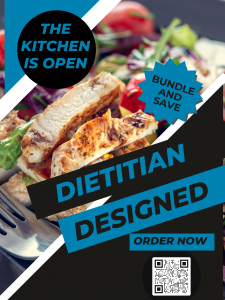
The Kitchen is open!
Our menu is fresh and changes every week!
Let us cook for you!
Check out more at nuleeu.com/kitchen
April: Spring Into Wellness

April is Digestive Health Month! Come explore how you can support your digestive health with us at Nuleeu Nutrition and Wellness.
 Weekly Nourishments
Weekly NourishmentsMarch Newsletter: National Nutrition Month
Topics:March is National Nutrition Month! Learn about “Fuel For the Future” and how Nuleeu is paving the way for the future of nutrition and health…
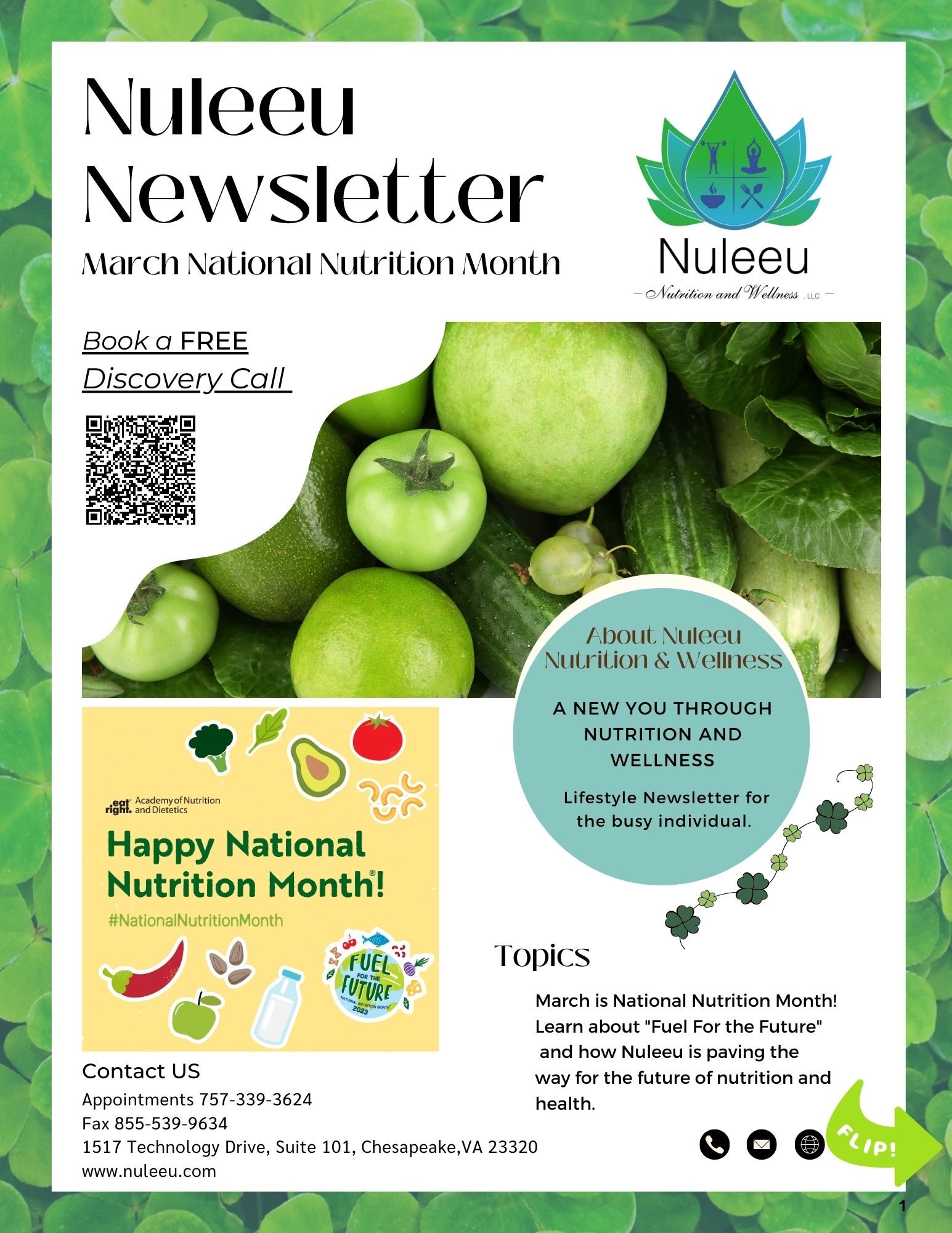
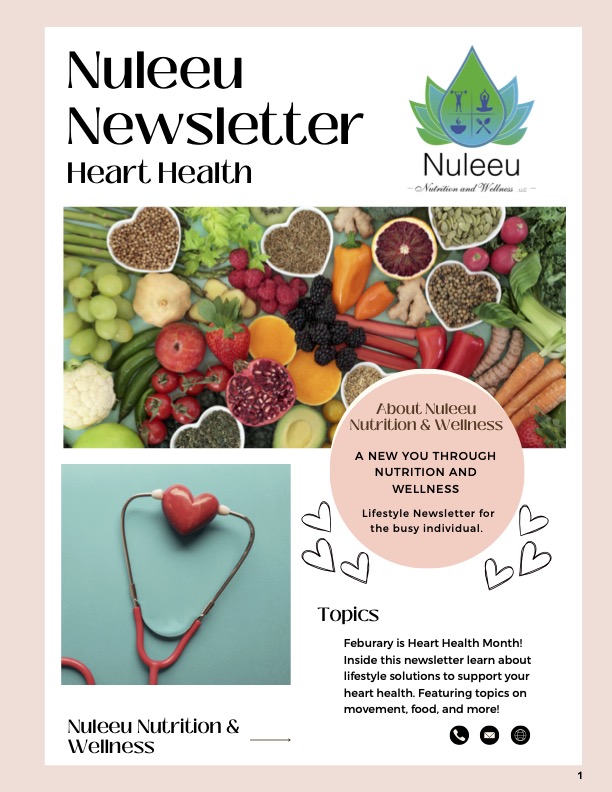 Weekly Nourishments
Weekly NourishmentsFebruary Newsletter: Heart Health
TOPICS: February is Heart Health Month! Inside this newsletter learn about lifestyle solutions to support your heart health. Featuring topics on movement, food, and more!
Sneak Peek: Recipe for the Dinner with a Dietitian is included!
February Newsletter by baileyk8
Nutrition and Mental Health

Elizabeth Fay, MS, RD, CSPCC, LD, CNSC
Nutrition plays a critical role in supporting our physical health, but research has also shown the powerful impact it can have on our mental health. As we know, a full wellness approach can support the mind and body, so taking into account physical activity, stress reduction techniques such as yoga or meditation, as well as nourishing nutrition can help to fully support your health. Let’s review the recent literature together to learn more about the correlation between nutrition and mental health and which steps you might like to take to better support your wellness goals.
When it comes to mental health, major depression is one of the most common psychological diagnoses. In 2020, approximately 21 million US adults had experienced at least one major depressive episode. People with major depression tend to have high levels of monoamine oxidase (MAO) in their brain. When the body has excess monoamines, which are a type of neurotransmitter such as dopamine and serotonin, MAO is the enzyme that breaks down these excess neurotransmitters. Unfortunately, for people with major depression and therefore potentially high levels of MAO, serotonin and dopamine levels can be abnormally low due to the excess breakdown of these neurotransmitters. Fortunately, nutrition research has shown that some foods naturally inhibit MAO activity to prevent excessive breakdown of these important neurotransmitters for psychological regulation. For example, apples, berries, green tea, onions, peaches, and pears all contain phytonutrients that have the ability to inhibit MAO activity. Overall, research  participants who consume more fruits and vegetables demonstrate increased levels of happiness, energy, and an overall sense of calmness compared to control participants. If you are experiencing depression or have in the past, working with your Nuleeu Registered Dietitian one-on-one can be imperative to create a safe, feasible, and realistic nutrition plan together that meets your individual preferences and goals, while taking into account any medications and lifestyle factors.
participants who consume more fruits and vegetables demonstrate increased levels of happiness, energy, and an overall sense of calmness compared to control participants. If you are experiencing depression or have in the past, working with your Nuleeu Registered Dietitian one-on-one can be imperative to create a safe, feasible, and realistic nutrition plan together that meets your individual preferences and goals, while taking into account any medications and lifestyle factors.
Anxiety and other panic disorders are a common diagnosis among US adults. Currently, approximately 40 million US adults experience anxiety or other panic disorders each year. Research has indicated a growing association between omega-3 polyunsaturated fatty acids (PUFAs) and depression and anxiety. Foods rich in omega-3 fatty acids include fish such as salmon, mackerel, and tuna, nuts and seeds including flaxseed, chia seeds, and walnuts, and vegetable oils such as soybean oil and canola oil. As you work with your Nuleeu Registered Dietitian, together you can review if you are consuming adequate amounts of omega-3 PUFAs. Patients diagnosed with anxiety and other panic disorders may also be advised to limit caffeine and alcohol intake. Food and beverage sources of caffeine and alcohol may worsen symptoms of anxiety and panic disorders. Your Nuleeu Registered Dietitian can creatively meet your dietary preferences by  suggesting alternative solutions to meet your needs, while still supporting your taste preferences and matching your lifestyle.
suggesting alternative solutions to meet your needs, while still supporting your taste preferences and matching your lifestyle.
Nutrition has shown that it may play a role in impacting obsessive compulsive disorder (OCD). Researchers have noticed that patients with OCD tend to have lower levels of vitamin B12 and vitamin D, which may demonstrate that vitamin B12 and vitamin D may be involved in the etiology of OCD, as well as the severity of the disorder. Alternatively, researchers have argued that vitamin B12 deficiency or insufficiency may be a side effect of OCD, rather than it having a causational effect. Either way, ensuring adequate vitamin B12 intake regardless of mental health status is vital to prevent deficiency. Food sources of vitamin B12 include animal-based proteins and products, including meat, seafood, eggs, and dairy products. Plant-based vitamin B12 food sources include nutritional yeast and fortified foods, but working with your Nuleeu Registered Dietitian is imperative to ensure adequate amounts of plant-based vitamin B12-rich foods are included in your diet because absorption is impacted by dose and food source. Vitamin D-rich foods include fatty fish such as salmon and eggs, as well as vitamin D-fortified foods such as orange juice and cereal. Your Nuleeu Registered Dietitian can review your intake and work with you individually to make sure you are consuming enough vitamin D-rich foods. Your nutrition specialist can also assist with supplementation recommendations if needed. Of note, research has shown an improved correlation between stress management (specifically yoga) and OCD. Integrating yoga with its many different forms may be something that patients with OCD also consider as part of their lifestyle routine. No matter the reason you may seek a yoga practice, Nuleeu Nutrition and Wellness offers both in-person and virtual yoga classes with all experience levels welcome!
Bipolar disorder has a growing and variable amount of research when it comes to its relationship with nutrition. Some studies have indicated the importance and impact that omega-3 fatty acids may play on the disorder, while other research has shown no correlation. In this case, your Nuleeu Registered Dietitian can provide you with the latest evidence-based research and will take into account your medications, any other diagnoses you may have, as well as your overall nutrient intake in order to provide you with individualized nutrition therapy recommendations.
Nutrition has also proven to play an influential role in optimizing brain health and delaying brain aging. Approximately 5.8 million people are diagnosed with Alzheimer’s disease or related dementias in the United States. Research has demonstrated the association between oxidative stress and chronic, low-grade inflammation as major risk factors for brain aging and dementia. Therefore, antioxidant-rich foods have demonstrated their effectiveness at preventing or delaying the onset of dementia and improving brain cognition. Overall, increasing fruits, vegetables, and nuts have shown to be beneficial in improving cognitive ability. Specific antioxidants that have been of focus in the literature include carotenoids (specifically lutein and zeaxanthin) and flavonoids (specifically anthocyanins). Lutein and zeaxanthin-rich foods include spinach, kale, and collard greens. Berries, red cabbage, plums, and cherries are rich  in anthocyanins and can be easy and delicious additions to your meals and snacks. Working with your Nuleeu Registered Dietitian can be supportive when beginning to include antioxidant-rich foods. Together, your dietitian can modify your current recipes and suggest affordable and delicious approaches to increase these foods in your life in a simple manner to optimize brain health.
in anthocyanins and can be easy and delicious additions to your meals and snacks. Working with your Nuleeu Registered Dietitian can be supportive when beginning to include antioxidant-rich foods. Together, your dietitian can modify your current recipes and suggest affordable and delicious approaches to increase these foods in your life in a simple manner to optimize brain health.
For clients looking to focus on their nutrition for attention-deficit/hyperactivity disorder (ADHD), there is a growing body of literature on this topic with still many mixed results and inconclusive evidence. Some studies have demonstrated specific nutrient deficiencies, while other research has shown that suboptimal nutrient intake due to the nature of the disorder may be the cause of the nutrient deficiencies, rather than the deficiencies causing the disorder. Emerging research on the gut microbiome and its influence on ADHD has shown few results, however it may be worth considering probiotics in specific situations. Ensuring a well-balanced, nutrient-rich diet assisted by consistent intake can be one of the most supportive approaches for patients with ADHD. Your Nuleeu Registered Dietitian can provide you with realistic lifestyle modifications that may include reminders and cues to ensure adequate, high quality intake. The dietitian will also keep you up-to-date with the latest evidence and information regarding ADHD and diet. Patients looking to implement an elimination diet, followed by a re-introduction phase should always work with a Registered Dietitian. These clients can greatly benefit from the expertise and guidance of a dietitian given the restrictive nature of these diets and their multifactorial approach to avoid over-restriction, potential deficiencies, and lifestyle disruption.
The importance of regular, consistent intake along with a positive relationship with food has also shown to have a significant impact on our mental health. A positive relationship with your food intake allows for increased meal and snack satisfaction, flavor enjoyment, and adequate and accurate satiation. A relationship with food that needs healing can impact our mental health, as it can contribute to circular, distracting thoughts about food. Equally, the opposite can occur as well. If our mental health has us thinking about foods in a negative context, labeling or judging foods or food groups, or creating any level of guilt, then it can impact our relationship with food. This process can then become cyclical with our relationship with food impacting our mental health and our mental health contributing to our relationship with food. Working with an interdisciplinary team that includes a Registered Dietitian and Licensed Therapist or Psychiatrist or Psychologist can have a profound impact on healing your relationship with food or working through any mental health considerations that may be impacting your relationship with food. We want the experience of eating to be enjoyable for you! We want you to be able to enjoy the taste, texture, fullness, satisfaction, satiety, traditions, memories, and nostalgia that food provides. If this relates to you, working with your Nuleeu Registered Dietitian can help you build an individualized plan to heal your relationship with food.
Many clients may consider turning to supplements to help boost their nutrient intake in order to support their mental health. Unfortunately, supplements are not monitored nor approved for effectiveness by the United States Food and Drug Administration (FDA). Preference may be made towards increasing nutrient intake by choosing whole food sources. Choosing foods rich in specific nutrients helps increase your intake in a safe, satisfying, and often cost-effective manner, while also having the benefit of consuming other nutrients in the food. For example, omega-3 which walnuts also provide fiber, protein, copper, manganese, vitamin E, and magnesium. While an omega-3 rich supplement may only provide the omega-3 fatty acids. Of course working with your Nuleeu Registered Dietitian is vital to create the optimal supplementation plan for you. In some cases, supplements can be safe and may better meet your lifestyle and nutrition needs. Your dietitian can also review any drug-nutrient or nutrient-nutrient interactions to be aware of when choosing foods and supplements to ensure maximum safety and optimal absorption.
Although we have reviewed just a small number of mental health topics and diagnoses, your Nuleeu Registered Dietitian can discuss any mental illness or mental health concerns you may have. Your specialist will take into account your individual needs after reviewing your medical history, current lifestyle, dietary preferences, and eating patterns. Together you will create a safe, realistic, affordable, and delicious individualized plan that supports you to meet your goals and preferences.
References:
Brierley, Mary-Ellen E., et al. “Lifestyle Interventions in the Treatment of Obsessive-Compulsive and Related Disorders: A Systematic Review.” Psychosomatic Medicine, vol. 83, no. 8, 2021, pp. 817–833., https://doi.org/10.1097/psy.0000000000000988.
Esnafoğlu, Erman, and Elif Yaman. “Vitamin B12, Folic Acid, Homocysteine and Vitamin D Levels in Children and Adolescents with Obsessive Compulsive Disorder.” Psychiatry Research, vol. 254, 2017, pp. 232–237., https://doi.org/10.1016/j.psychres.2017.04.032.
“Facts & Statistics: Anxiety and Depression Association of America, ADAA.” Facts & Statistics | Anxiety and Depression Association of America, ADAA, https://adaa.org/understanding-anxiety/facts-statistics.
Hammond BR;Miller LS;Bello MO;Lindbergh CA;Mewborn C;Renzi-Hammond LM; “Effects of Lutein/Zeaxanthin Supplementation on the Cognitive Function of Community Dwelling Older Adults: A Randomized, Double-Masked, Placebo-Controlled Trial.” Frontiers in Aging Neuroscience, U.S. National Library of Medicine, https://pubmed.ncbi.nlm.nih.gov/28824416/.
Klevebrant, Lisa, and Andreas Frick. “Effects of Caffeine on Anxiety and Panic Attacks in Patients with Panic Disorder: A Systematic Review and Meta-Analysis.” General Hospital Psychiatry, vol. 74, 2022, pp. 22–31., https://doi.org/10.1016/j.genhosppsych.2021.11.005.
Lange, Klaus W. “Micronutrients and Diets in the Treatment of Attention-Deficit/Hyperactivity Disorder: Chances and Pitfalls.” Frontiers in Psychiatry, vol. 11, 26 Feb. 2020, https://doi.org/10.3389/fpsyt.2020.00102.
Larrieu, Thomas, and Sophie Layé. “Food for Mood: Relevance of Nutritional Omega-3 Fatty Acids for Depression and Anxiety.” Frontiers in Physiology, vol. 9, 2018, https://doi.org/10.3389/fphys.2018.01047.
Lindbergh CA;Mewborn CM;Hammond BR;Renzi-Hammond LM;Curran-Celentano JM;Miller LS; “Relationship of Lutein and Zeaxanthin Levels to Neurocognitive Functioning: An Fmri Study of Older Adults.” Journal of the International Neuropsychological Society : JINS, U.S. National Library of Medicine, https://pubmed.ncbi.nlm.nih.gov/27776568/.
“Major Depression.” National Institute of Mental Health, U.S. Department of Health and Human Services, https://www.nimh.nih.gov/health/statistics/major-depression.
Marzo, Claudio Marcello, et al. “Inhibition of Human Monoamine Oxidases A and B by Specialized Metabolites Present in Fresh Common Fruits and Vegetables.” Plants (Basel, Switzerland), U.S. National Library of Medicine, 27 Jan. 2022, https://www.ncbi.nlm.nih.gov/pmc/articles/PMC8838583/.
Mewborn CM;Terry DP;Renzi-Hammond LM;Hammond BR;Miller LS; “Relation of Retinal and Serum Lutein and Zeaxanthin to White Matter Integrity in Older Adults: A Diffusion Tensor Imaging Study.” Archives of Clinical Neuropsychology : the Official Journal of the National Academy of Neuropsychologists, U.S. National Library of Medicine, https://pubmed.ncbi.nlm.nih.gov/29161349/.
Millichap, J Gordon, and Michelle M Yee. “The Diet Factor in Attention-Deficit/Hyperactivity Disorder.” Pediatrics, U.S. National Library of Medicine, 9 Jan. 2012, https://pubmed.ncbi.nlm.nih.gov/22232312/.
Saunders, Erika F., et al. “Adjunctive Dietary Intervention for Bipolar Disorder: A Randomized, Controlled, Parallel‐Group, Modified Double‐Blinded Trial of a High N‐3 plus Low N‐6 Diet.” Bipolar Disorders, vol. 24, no. 2, 2021, pp. 171–184., https://doi.org/10.1111/bdi.13112.
Pinto, Sofia, et al. “Eating Patterns and Dietary Interventions in ADHD: A Narrative Review.” Nutrients, U.S. National Library of Medicine, 16 Oct. 2022, https://www.ncbi.nlm.nih.gov/pmc/articles/PMC9608000/.
“The Truth about Aging and Dementia.” Centers for Disease Control and Prevention, Centers for Disease Control and Prevention, 20 Aug. 2019, https://www.cdc.gov/aging/publications/features/Alz-Greater-Risk.html.
Upadhyaya, Suneet Kumar, and Archana Sharma. “Obsessive Compulsive Disorder Due to B12 Deficiency: Justification Required.” Indian Journal of Psychological Medicine, vol. 34, no. 3, 2012, pp. 298–299., https://doi.org/10.4103/0253-7176.106045.
Vilarim, Marina Machado, et al. “Caffeine Challenge Test and Panic Disorder: A Systematic Literature Review.” Expert Review of Neurotherapeutics, vol. 11, no. 8, 2011, pp. 1185–1195., https://doi.org/10.1586/ern.11.83.
Looking for a New Fitness Routine?
We know it is that time of year, everyone is thinking about wellness and health. While not big fans of resolutions, we are huge fans of wellness and fun fitness!
Starting a new wellness program is hard, we totally get it! Busy schedules, poor sleep habits, long commutes, routines, habits and more, adding something new can be really hard.
Here are a few tips we have found to be helpful when trying to form a new routine:
- Write it down… Yes, everyone says this, but what we mean is write down the ideal routine. Start by writing down what your ideal routine would look like in total, every day, in an ideal setting, without any limitations and barriers. Then we will work backwards.
 Now, take a look at that ideal scenario, and make a list of barriers that prevent this from coming true. This could be anything from hard to wake up because not sleeping enough to no time to hike 3 hours during the week.
Now, take a look at that ideal scenario, and make a list of barriers that prevent this from coming true. This could be anything from hard to wake up because not sleeping enough to no time to hike 3 hours during the week.- Next, cross out the parts of your routine that are due to barriers that you cannot change and really do not want to do.
- If you want to hike during the week, but work a full-time schedule, likely you need to come up with a new ideal routine (or new job) but right now it is most likely not realistic. Maybe you want to walk in the morning, but you would have to start before the sun comes up, or you are not a morning person because you do not sleep very well.
- Then, write in something that is realistic, such as walking in the evening until the sunrise is earlier.
- Circle the barriers you can address, and star the items that are related to that barrier.
- In this example, poor sleep prevents early rising, so this can be addressed, but may take time, so having a backup plan is also beneficial.
- Write a plan that will address the barriers
- Write a plan on how you will start small and build up to your goal:
- Start walking in the evenings, 2 times a week for 30-minutes and slowly build to 3 times, 4 times and 5 times a week to build the routine.
- Be kind with yourself as you start the plan. Set-backs are normal and expected. But being gracious with yourself will make you more likely to continue the plan.
Making a plan is always a great first step to starting a new routine. Writing it down helps to bring it down from being a wish. Finding support groups to join, communities that share your goals and passion, using coaching and other resources are all great too, but we always start with a plan.
Making your plans? What about Pilates?
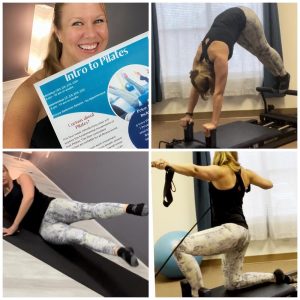
This four-week introductory class will explore the fundamental movements of mat Pilates. The slow-controlled exercises are suitable for all fitness levels.
We will break down each movement allowing time for focus on breath, proper muscle activation, and the overall mind- body connection. Additionally, you can look forward to learning about Joseph Pilates, his original bodyweight exercises, and the many benefits of Pilates, like less pain, better balance, improved endurance, and more!
In addition to 8 group classes, you will receive a one-hour private session on the reformer. The Pilates Reformer is a fitness experience like no other! It’s fun and safe for all fitness levels.
![]() Price: $145, over $150 in savings!
Price: $145, over $150 in savings!
- Eight intro classes 60-minutes long
- (one) 60-minute private reformer session
- Bonus access- attend Mixilates every Friday during the program!
- Join a great, supportive community that loves fun fitness and wellness!
Mondays 1/30, 2/6, 2/13, 2/20 9 am – 10 am in-studio
Wednesdays 2/1, 2/8, 2/15, 2/22 9 am – 10 am in-studio
Private Reformer Session – by appointment
Request more info Using this link
Check Out What’s Happening!
Today We Are Thankful
It’s that time of year, when you catch yourself saying “where did the year go?” or “how are we already at the end of November?!?”
It happens every year, even more so in the last few with all the changes and challenges. 2022 came with some new challenges, but our team pushed through. We may have had some changes along the way, but we are stronger and better than before. We have added new services and gotten rid of some. We have renovated and revamped to improve on everything. We are always looking at ways to improve, and listen to all of our client feedback to create the best system and services we can.
So, today I take a moment to pause and reflect, make my list of gratitude and say

Thank you for being with us. We are here for you and thrive because of you.
Now here we are, nearing the end of 2022, planning an exciting 2023, and it’s all because of you!
Thank you from everyone at Nuleeu!
Nutrition and Fertility for Women
Author: Mattie Hinson, ACE-CPT, Fitness Nutrition Specialist, Weight Management Specialist and Health Coach
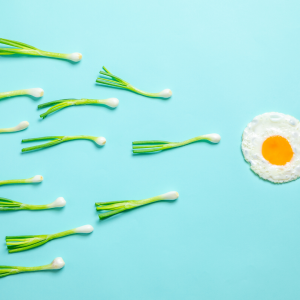
Factors affecting fertility are great and varied amongst women. Nutrition and exercise can have big impacts for fertility health.
FIRST, let it be known that fertility health is for all premenopausal women. Often, we think about fertility equating to the act of becoming pregnant. While this is often true, your fertility has great impacts on the rest of your body health. In other words, how “fertile” you are is a great indication of your overall health. In fact, having a regular, predictable, and manageable menstrual cycle (not birth control bleed) is one of the best windows into your fertility health.
But, hold on, I said fertility health is for all women to care about even if you are not actively trying to get pregnant. Why? Your fertility is directed by other systems in the body. Often, if you are having trouble with your menstrual cycle, getting pregnant or fertility issues, something else is going wrong in the body. Fertility reflects adequate metabolic health, protects bones, and is important for cardiovascular health.
Luckily, there are some easy things you can do and include in your lifestyle to help increase your fertility and strengthen your reproductive health.
-REDUCE STRESS. This is huge. Stress in any form—be it physical, mental or emotional is a fertility killer. Make sure that you are taking time out of your busy life to do things that you enjoy and to rest.
-TRACK, TRACK, TRACK. Keep a “period journal” and write down everything from feelings, moods, hunger levels, exercise, cervical mucus (yes, you need to pay attention to that). Get in touch with your cycle length, what stressors affect it and how you feel. Having a regular, predictable cycle is a winning way to get pregnant easily. Also, there are lots of apps out there that help you keep track of what is happening with your cycle!
-SLEEP well. Ensure that you get adequate and quality sleep. Aim for 7-9 hours per night.
-EAT PLENTY. Not the time to diet. Living in a calorie deficit may cause ovulation problems which can interfere with your ability to get pregnant.
-FLAX SEED. Include about 1 tablespoon per day. Flax seed is a phytoestrogen that can help![]()
increase natural estrogen levels in your body. It has also been found to help regulate cycles.
-VITAMIN C. You may consider a Vitamin C supplement if you have a short window from the time you ovulate to the time you start your period. This is called a short luteal phase and has been linked to trouble getting or staying pregnant. Vitamin C can help extend the luteal phase!
-FULL FAT DAIRY. Ditch the fat free and low-fat products (and never go back again). Full fat dairy is protective of ovulation while low-fat and fat free dairy has been found to contribute to ovulatory dysfunction.
-FATS. Make sure you eat enough fats which help with hormone production. You will need this to make a baby, folks. Include sources like nuts, nut butters, grass-fed butter, coconut oil, avocados.
-Exercise MODERATELY. Probably not the time to start a 5-day per week boot camp program or train for a marathon. While exercise in moderation is great for your body in so many ways, it is a stressor. Remember, stress is not so good for fertility. Incorporate moderate exercise like walking, jogging and strength training a few times per week. Skip the high intensity for now.
-PRENATAL. Consider including a high-quality whole foods prenatal vitamin. Ensuring that your vitamin and mineral levels are topped off will help to ensure you have a healthy pregnancy. A LOT of baby development happens before many women even know if they are pregnant so ensuring good nutrition before pregnancy is a great idea.
-ANTIOXIDANTS. These are components in foods like vegetables, fruits and whole grains and work to keep your cells healthy. Instead of trying to aim for one type of antioxidant, include a rainbow of colors on your plate. Antioxidants help make healthy cells which will encourage a healthy cycle and fertility.
-Reduce ALCOHOL. Chronic and excessive alcohol ingestion puts a major strain on your organs and can contribute to nutrient deficiencies. However, don’t be afraid to include alcohol in moderate amounts. There are benefits including antioxidant content, micronutrients, and stress reduction if alcohol is something that you enjoy.
-TAKE CARE OF YOURSELF. In whatever form that means. Prioritize your health—physical, mental, emotional and spiritual. Chill out and find something to smile about. Have “you” time. Practice self-care. Enjoy the time before you have children. It is ALL so precious.
Remember to reach out to an expert at Nuleeu for more guidance on how your diet and exercise might be impacting your fertility health!
Schedule a Free Initial Consultation to Learn More
References:
Shmerling R. Fertility and Diet: Is there a Connection? Harvard Health Publishing. 2018. https://www.health.harvard.edu/blog/fertility-and-diet-is-there-a-connection-2018053113949.
Panth N et al. The Influence of Diet on Fertility and the Implications for Public Health Nutrition in the United States. Front Public Health. 2018. https://www.ncbi.nlm.nih.gov/pmc/articles/PMC6079277/#__ffn_sectitle.
